

By Tim Gillespie
How Does Uncle Tim's Building Blocks Work?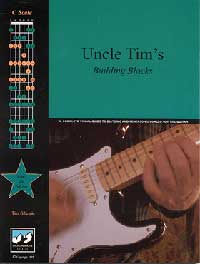
Simply! Here is the concept behind every page of UTBB.
On the fretboard of the guitar is a pattern of notes, once you learn it, you have immediate access to every scale in every part of the fretboard, for every key.
And it is easy to learn the pattern if you look at a picture of it, and music theory is what creates this pattern. This approach makes it super easy! Super easy!
There is nothing like it and nothing can make up for it. For $20, you can put this all to rest right now. Pick up a copy today.
eBooks are delivered instantly!
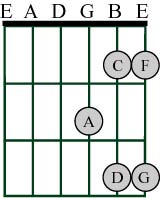
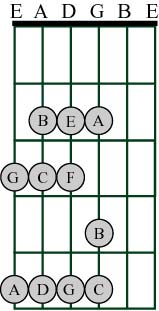
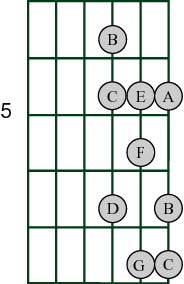
Here are three small fragments in the key of C major. The exercises this month are centered around taking these notes and playing them out of order. Make up some new routes and practice them slowly. Try to play each improvised lead at least ten times.
Try to play no more than three consecutive notes without breaking up the order.
You are trying to develop some interesting passages. The only way to determine what you think is interesting is to experiment. We can talk about this for a long time, but the way you understand this is to try it. The more you try this, the easier it will become. This is like improvising, the best results will come if you are not too critical. You are not trying to create the greatest lead ever, you are just trying to jump start your abilities.
If you have another guitarist you can practice with, pick some simple chords in the key of C major and make up some lead lines. The basic chords in the key of C major are listed here.


Consider recording some of these leads if you have the equipment. You may be surprised how nice some of the combinations are that you come up with.
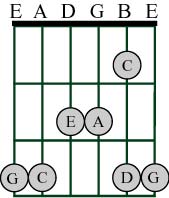 This is
the first position C major pentatonic scale. Because pentatonic scale
notes are spaced farther apart, they can be easier to construct solos
with. Try developing runs using this pattern of notes. You may find that
it is easier to build tasteful solos using this scale.
This is
the first position C major pentatonic scale. Because pentatonic scale
notes are spaced farther apart, they can be easier to construct solos
with. Try developing runs using this pattern of notes. You may find that
it is easier to build tasteful solos using this scale.
This is the same scale as the diatonic except the four and seven degrees are left out. This is why this scale has bigger spaces between notes.